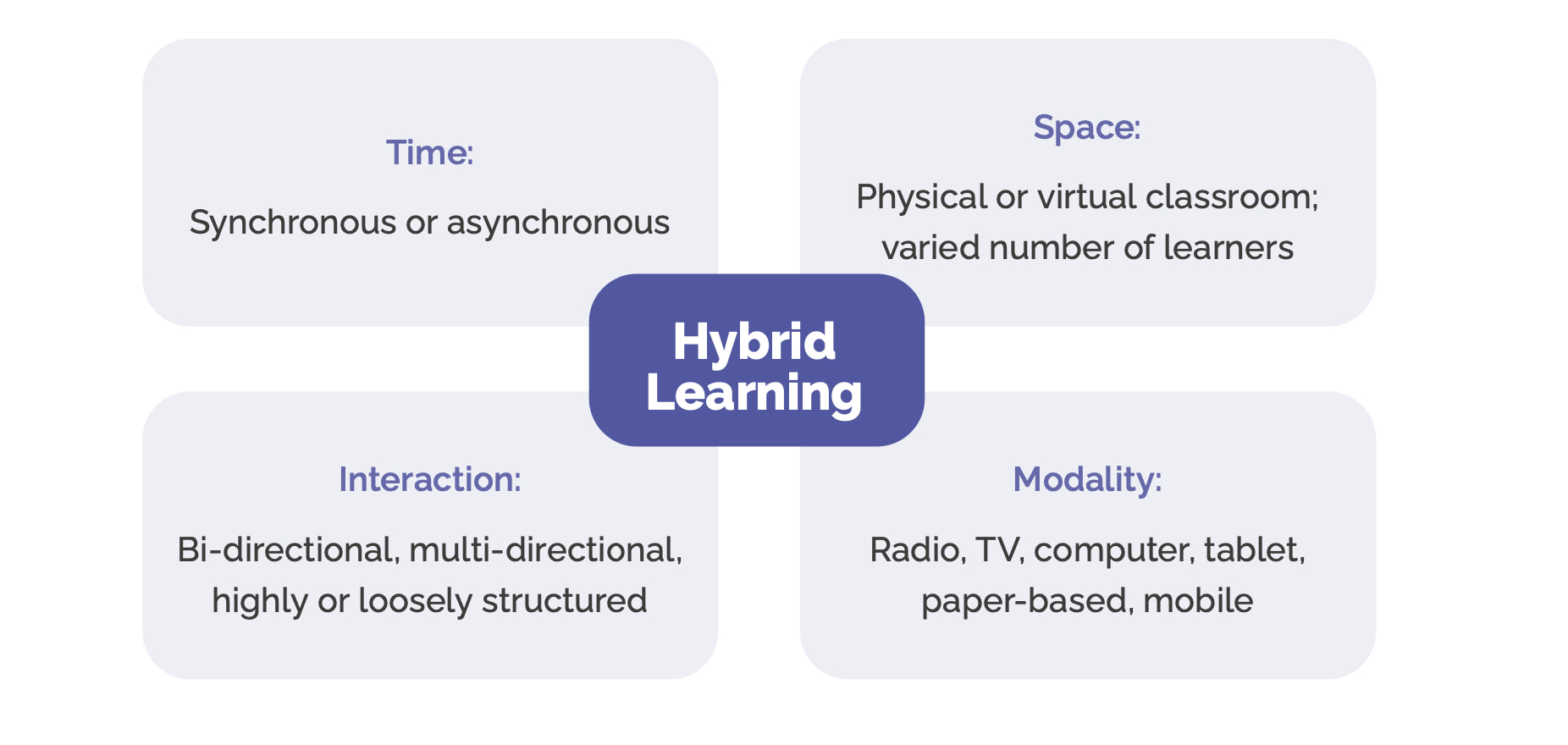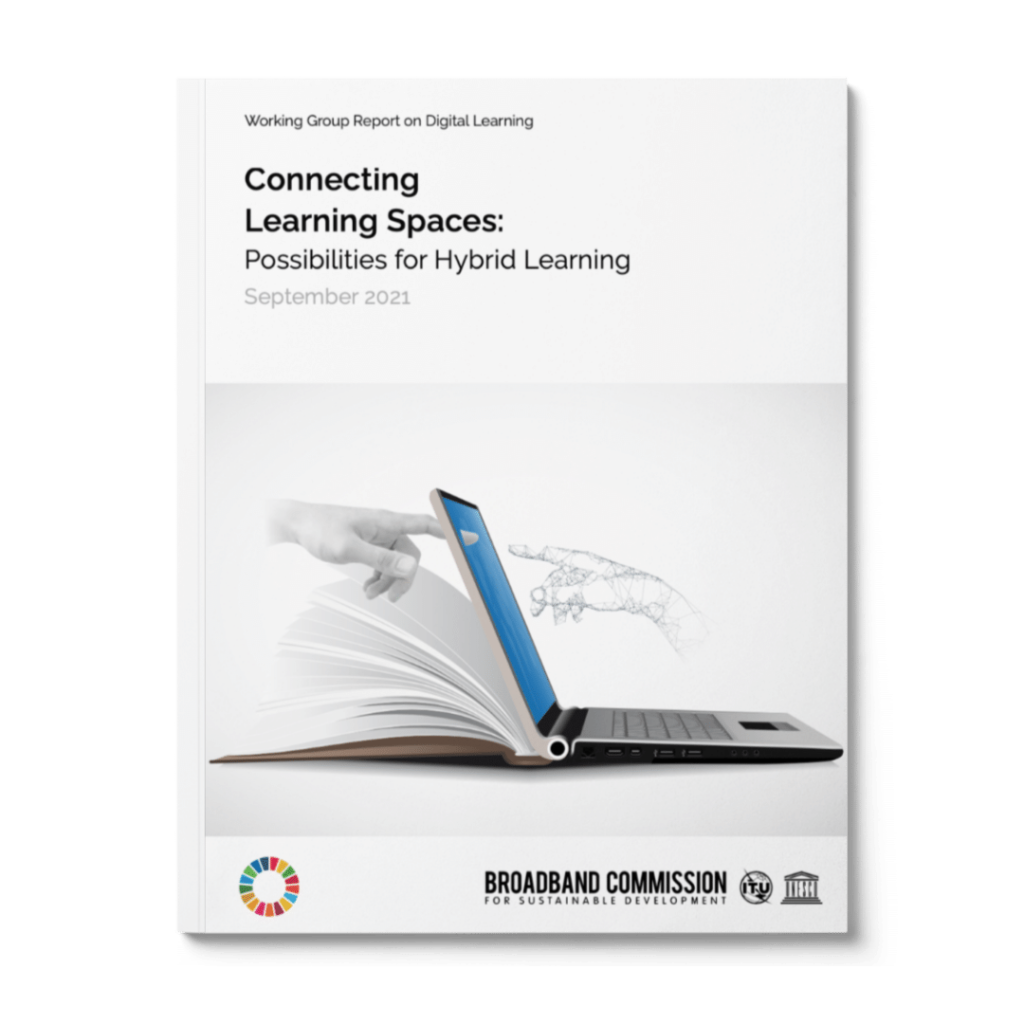How can we ensure that everyone benefits from flexible learning models?
The Broadband Commission Working Group on Digital Learning was organized to address concerns with education’s digital transition and provided enabling strategies for hybrid learning as well as framing for future developments.
Co-Chaired by Ms. Audrey Azoulay, Director-General of UNESCO, Mr. Houlin Zhao, Secretary-General of ITU, Mr. Erik Ekudden, CTO and Senior Vice President of Ericsson, and Ms. Sun Yafang, Member of Core Elite at Huawei, the Working Group demonstrated that the implementation of hybrid learning strategies requires not only meaningful and affordable connectivity for all learners, but also a policy framework which guarantees that all learners, families and communities are fully capable of benefitting from the affordances offered by technologies, while also ensuring their safety and privacy.
Setting the Stage
Background Overview
The COVID-19 pandemic has dramatically changed education. In 2020, schools around the world were fully closed for 79 instructional days on average. The shift to distance teaching and learning has been the key immediate policy response, bringing ed-tech from the periphery to the centre of education systems.
What is hybrid learning?
Hybrid learning, a model that combines face-to-face instruction with computer-mediated pedagogies, is at the core of the discussion and analysis of pandemic learning that is presented in this Report. A common element across all of hybrid learning’s plurality of forms is that they have a close and direct relationship with the use of technologies and digitalization in education.
Hybrid learning enables students to study in flexible ways, online or face-to-face, according to their circumstances and preferences. A hybrid teaching session may have some students in class and some participating remotely. Crucially, students have some control over the time, place, path and/or pace of study.
The Way Forward
Findings and Recommendations
Sustainable hybrid learning systems should be inclusive, generating value through contextualized and open educational resources. They should celebrate local identities and languages, while benefitting from global ecosystems, initiatives, value chains, resources and knowledge.
The Working Group’s outcome report, Connecting Learning Spaces: Possibilities for Hybrid Learning, puts forth recommendations to provide informed and contextualized guidance to policymakers and other education stakeholders who aim to implement new learning strategies, while also acknowledging the benefits and risks of hybrid learning.
In addition, the 2021 report concludes with a compendium of country case studies, frameworks, tools, and frontier technologies. These aim to provide examples of best practices for the delivery of digital learning. Download the report to access the compendium.
Five recommendations for improving educational access and delivery with digital technology
 Hybrid learning combines face-to-face instruction with computer-mediated pedagogies. Models of hybrid learning should be developed to support inclusive education as a public, common good.
Hybrid learning combines face-to-face instruction with computer-mediated pedagogies. Models of hybrid learning should be developed to support inclusive education as a public, common good.
 To overcome the social and economic dimensions of the digital divide, national stakeholders should define system-wide strategies to develop a skilled and digitally ready society.
To overcome the social and economic dimensions of the digital divide, national stakeholders should define system-wide strategies to develop a skilled and digitally ready society.
 To bridge the digital divide and support the local development of digital education and training systems.
To bridge the digital divide and support the local development of digital education and training systems.
 This requires an institutional, cross-sector policy framework, participatory planning, and social dialogue.
This requires an institutional, cross-sector policy framework, participatory planning, and social dialogue.
 By establishing regulatory frameworks for the ethical and human-rights-based use of frontier technologies. Particular consideration should be given to learners’ data protection and security, as well as to environmental sustainability.
By establishing regulatory frameworks for the ethical and human-rights-based use of frontier technologies. Particular consideration should be given to learners’ data protection and security, as well as to environmental sustainability.
- This report stresses the need to have a context-based approach and puts particular emphasis on the multiple enabling strategies required for hybrid learning to be authentically inclusive and equity-minded.
The Working Group Model
Composition and Activities
Ms. Audrey Azoulay
Director General, UNESCO, Co-Vice Chair of the Broadband Commission
Mr. Houlin Zhao
Secretary General, ITU, Co-Vice Chair of the Broadband Commission
Mr. Erik Ekudden
Senior Vice President, CTO and Head of Group Function Technology, Ericsson
Ms. Sun Yafang
Member of Core Elite, Huawei
Co-Chairs: Audrey Azoulay, Houlin Zhao, Erik Ekudden, Sun Yafang
- Mr. Erik Ekudden, Ericsson
- Ms. Sun Yafang, Huawei
- UNESCO
- ITU
- Mr. Carlos Jarque, America Movil
- Dr. Dato Ir. Lee Yee Cheong, Malaysia
- Mr. Robert Kirkpatrick, UN Global Pulse
- Mr. Achim Steiner, UNDP
- Government of Rwanda
- Mr. Mats Granryd, GSMA
- Dr. Ann Aerts, Novartis Foundation
- Dr. Hyeonmo Ku, KT Corporation
- Mr. Piotr Dmochowski-Lipski, EUTELSAT IGO
- Mr. Hans Vestberg, Verizon
- Mr. Qu Dongyu, FAO
- Ms. Phumzile Mlambo Ngcuka, UN Women
- UNHCR
- UNICEF
- Ms. Bella Rwigamba, Chief Digital Officer for the Ministry of Education in Rwanda
- Mr. Alexandre Barbosa, UNESCO Regional Centre for studies on the Development of the Information Society
- Mr. Christopher Yoo, University of Pennsylvania
- Mr. Kris Gopalakrishnan
- Mr. Urs Gasser, Executive Director of the Berkman Klein Center for Internet & Society at Harvard University and a Professor of Practice at Harvard Law School
- Ms. MienDee Yong, CourseNetworking
- Ms. Lucia Dellagnelo, Center for Innovation in Brazilian Education
- Mr. Han Liqun, former dean of School of information engineering, Beijing Technology Business University
- Ms. Liesbet Steer, Education Commission
- Ms. Amy Bellinger, Education Commission
- Ms. Rose Sagun, Education Commission
- Mr. Ravi Suchak, Vice President, Public Affairs, American Tower Cooperation
- Mr. Maikel Wilms, Boston Consulting Group
- Ms. Joanna Rubinstein, World Childhood Foundation
- Mr. Amer Baig
- Ms. Maria Florencia Ripani, Fundación CEIBAL
- Mr. Turhan Muluk, Intel
- Mr. John Roman, Intel
- Mr. Nuno Martin, Intel
- Dr. Mutlu Cukurova, University College London
- Mr. Joel Hellermark, SanaLab
- Dr. Carol O’Donnell, Smithsonian Science Education Centre
- Dr. Tarek Chehidi, Teach For All
- Mr. Larry Irving
- Prof. François Grey, Director, Geneva Tsinghua Initiative, University of Geneva
- Mr. Dejan Jakovljevic
- Mr. Mike Sharples, Professor, The Open University
- Mr. Mitja Jermol, UNESCO Chair in Open Technologies for Open Educational Resources and Open Learning
- Ms. Tracey Burns, Senior Analyst in the OECD’s Centre for Educational Research and Innovation
- Mr. Dominic Vergine, Head Of Sustainability, VP at Arm, Founder WEF 2030Vision, Co-founder The Centre for Global Equality, ARM.com
- Ms. Nicola Doody, Senior Strategy Manager at Accenture
- Mr. Luis Pinto, Education Venture Capital expert, BizDev Udemy Government
- Ms. Audrey Scozzaro Ferrazzini, Senior Director, Government Affairs, Qualcomm
- Ms. Liz Sproat, Global Head of Learning and Outcomes at LEGO Education
- Mr. Mario Franco, Founder & Chairperson Millennium @EDU SUSTAINABLE EDUCATION
- Ms. Radhika Iyengar, Director Education Sector, Center for Sustainable Development, The Earth Institute, Columbia University, New York
- Mr. Charley Wrigh
- Shanti Jagannathan, Asian Development Bank:
- Jeanette Burmester and Marina Janssen, GIZ
- Alessandro Brolpito, European Training Foundation (ETF)
- Karine Sonigo, International Labour Organization (ILO)
- Pasqualino Mare, European Commission
Key Strands of the Working Group Research

Infrastructure
Led by ITU
Innovation in infrastructure and connectivity operating models to ensure inclusive and sustainable digital learning (in synergy with the Giga initiative, the joint initiative between ITU and UNICEF to connect every school to the internet and every young person to information, opportunity, and choice).
Hybrid Learning
Led by UNESCO
Understanding the human dimensions that facilitate effective hybrid learning, including analysis of appropriate roles for teachers and other facilitators, sustainable models of curriculum-aligned resource production and dissemination, and successful home-based and blended pedagogical learning practices.
Digital Skills
Led by Ericsson
Competencies to use connected technology for learning and empowerment, digital skills for employability, anticipated labour market demands, and abilities to navigate shifting and disrupted labour markets.
The Impact of Frontier Technologies
Led by Huawei
Scenarios for the future of digital learning, educational implications and advantages of frontier technologies including AI, Internet of Things, 5G, machine learning, data analytics, etc.
The Working Group was launched during the Broadband Commission Annual Fall Meeting in New York on 22 September 2019. In the course of this engagement, the Group identified the most relevant solutions to address the broadband connectivity gap. The Working Group is composed of policymakers and significant partners and actors in the technology industry, as well as intergovernmental organizations (IGOs). It offers a key cluster of experts providing guidance for the international community’s dialogue on the recovery, resilience and future development of education and training, with a specific focus on digital learning. During its tenure, the Working Group has generated research and analysis, knowledge and resources, advocacy, and foresight on challenges and opportunities related to hybrid learning.
Stay engaged with the report
Click the icon to download the promotional toolkit for access to social copy, graphics, quote cards, key messages, and more.
Focus Area
Outcome Resources
Co-Chairs
Audrey Azoulay
Director General, UNESCO and
Co-Vice Chair of the Broadband Commission
&
Houlin Zhao
Secretary General, ITU and Co-Vice Chair of the Broadband Commission
&
Erik Ekudden
Senior Vice President, CTO and Head of Group Function Technology, Ericsson
&
Sun Yafang
Member of Core Elite, Huawei
Broadband Advocacy Targets
SDGs












